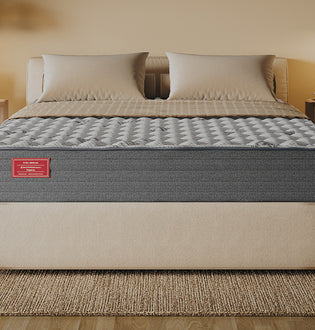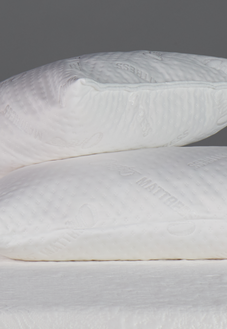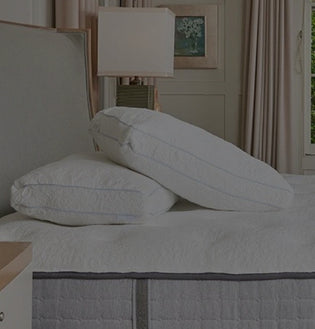You’re in the mattress aisle, staring at dozens of options. One says “firm,” the next says “soft.” Your head starts spinning. Picking mattress firmness is more than just feel—it can make or break your sleep quality. When it comes to picking the right mattress, the question of firmness can leave you wide awake. Some people swear by cloud-like softness, while others won’t sleep on anything but a firm, supportive surface.
So, should you sleep on a hard or soft mattress? In this article, we’ll break down how your sleep style, body type, and comfort preferences can help guide your choice. Whether you love the feeling of sinking in or staying steady, finding the right firmness can make all the difference in how well you rest.
What’s the Difference Between a Hard and Soft Mattress?
-
Hard Mattress: A hard mattress, also called a firm mattress, doesn’t sink much when you lie down. It stays flat and supports your body evenly. You won’t feel like you’re sinking into it.
-
Soft Mattress: A soft mattress feels plush and cushiony. When you lie down, it hugs your body and lets you sink in a bit. It feels cozy and gentle.
Who Should Sleep on a Hard Mattress?

Back and Stomach Sleepers
If you sleep on your back or stomach, a firm mattress helps keep your hips from sinking too much. When your hips sink, your spine can bend out of shape, causing discomfort. A hard mattress holds your body up and keeps your spine straight while you sleep.
Heavier Individuals
If you weigh more, you press deeper into the mattress. Soft beds can sag under your weight and feel uneven. Firm mattresses support your body better and don’t sink too much. This helps you sleep comfortably and keeps your mattress lasting longer.
Those with Lower Back Pain
If your lower back hurts, a firm mattress can give your body the support it needs. It helps keep your spine steady and prevents you from sinking too deeply. This support can help alleviate pain and improve your sleep quality, allowing you to wake up feeling better. Still, some people find medium firmness more comfortable, so try different options if you can.
People Who Like a “Sleeping on Top” Feel
Some people don’t like the feeling of sinking into a mattress. They want a bed that feels solid and supports them. A firm mattress gives you that “sleeping on top” feeling, where you rest on the surface instead of sinking.
Who Should Sleep on a Soft Mattress?

Side Sleepers
If you sleep on your side, your hips and shoulders press more into the bed. Soft mattresses provide these areas with extra padding, so they don’t hurt. This helps keep your spine in a good position and lets you sleep without pain.
Lightweight Sleepers
If you weigh less, a firm mattress might feel too hard. You won’t press into it enough to get good support. A soft mattress feels gentler and molds to your body, making it easier to get comfy and fall asleep.
Those with Shoulder or Hip Pain
If you often wake up with sore hips or shoulders, the best soft mattress can provide relief. It cushions these sensitive spots and takes pressure off them. This can help reduce pain and improve your sleep quality.
People Who Like a “Sinking In” Feel
Some people love feeling like they’re cradled by their mattress. A soft mattress lets you sink in a little and feels warm and cozy. If you like that snug, hugging sensation, a soft mattress is a good choice.
Which One is Better?
There’s no perfect answer to this because “better” depends on what your body needs and what feels right to you. Everyone has different preferences, body types, and sleeping habits. What works for one person might not work for another.
To figure out which mattress is better for you, think about these questions:
Do I like to sink into my bed or stay on top of it?
If you enjoy that “hugging” feeling, a soft mattress may feel more comfortable. If you prefer a feeling of support and stability, a firmer mattress might be a better fit for you.
Do I wake up with back or joint pain?
If your lower back hurts when you wake up, it might be a sign that your bed isn’t offering enough support, especially if it’s too soft. While soft mattresses for back support do exist, not all soft beds provide the structure your spine needs. A firmer mattress can help keep your back aligned. But if your shoulders or hips hurt, especially as a side sleeper, a softer mattress may still be the better choice to relieve pressure in those areas.
What position do I usually sleep in?
-
Side sleepers often prefer soft to medium-firm mattresses to cushion pressure points.
-
Back sleepers need a balance—usually a medium-firm mattress for spine support.
-
Stomach sleepers need a firm surface to keep their hips from sinking, which can strain the back.
Find Your Perfect Mattress Firmness Today
Don’t guess—listen to your body’s needs and sleeping style to pick the best fit. For mattress options, visit Ortho Mattress to explore hard and soft mattresses designed to support your unique comfort preferences and help you wake up pain-free.
Final Thoughts
Still asking yourself, should I sleep on a hard or soft mattress? Just listen to your body. If your back feels stiff in the morning, you might need a firmer bed. If your shoulders or hips ache, a softer one could help. The right mattress depends on how you sleep and what feels best for you. Try different options and see what gives you better rest. Finding the right answer to sleep on a hard or soft mattress can make a big difference in how well you sleep every night.
FAQs
Does body weight affect firmness needs?
Definitely. Heavier sleepers often feel more supported on firmer mattresses because they don’t sink too much. Lighter sleepers may find soft to medium beds more comfortable because they offer more cushioning and pressure relief.
Is a hard mattress always better for back pain?
Not always. A firm mattress can support your spine, but if it feels too hard, it might cause pressure on your lower back or hips. It’s about finding a balance that gives you support without feeling like you’re sleeping on the floor.
How do I know if my mattress is too soft or too firm?
If you wake up with stiffness or pain, your mattress might not be right for your body. Try lying down in your usual sleep position and see how it feels after 10–15 minutes. Your body should feel supported without pressure spots.
Can sleeping on the wrong mattress cause health issues?
It can lead to poor sleep and increased aches or pains. Good support helps prevent problems like back pain and stiffness.
Does mattress firmness affect sleep quality?
Yes, firmness can change how well you sleep. The right firmness supports your body and keeps you comfy all night, helping you wake up refreshed.




